On Significance of U.S. Elections
• Discussion on Elections Addresses the Way Forward
• Practical Measures Needed to Change the Situation in a Way that Favors the Workers
• Positions of Trade Unions on the Elections
Discussion on Elections Addresses the Way Forward
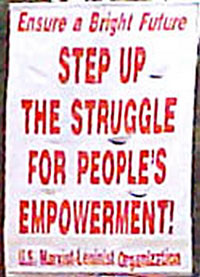 “What to do now that Trump has been elected?” is a concern being raised by many. A recent meeting in Hamilton, Ontario, on the U.S. Elections addressed this concern. The tone and orientation was given by the presentations made. As the main talk brought out, “Political discussion and analysis on the significance of the U.S. election results is the starting point to creating a political movement which favors the people.” Kathleen Chandler, Voice of Revolution Editor and leader of the U.S. Marxist-Leninist Organization had the honor of giving the keynote, titled “The Need to Confront Government of Police Powers by Building the New” (see http://usmlo.org/arch2016/2016-12/VR161213.htm#01). Rejecting the pressure to respond to every tweet and action by Trump, the presentation and discussion afterwards emphasized that providing analysis and a space for discussion and the thinking that develops is doing a vital part of what is needed. The presentation further emphasized, “We need to be pro-active by having our own program which gives rise to new forms and gives birth to the new. As we respond to all the attacks on the people, if we are pro-active, the resistance movement will make great headway.”
“What to do now that Trump has been elected?” is a concern being raised by many. A recent meeting in Hamilton, Ontario, on the U.S. Elections addressed this concern. The tone and orientation was given by the presentations made. As the main talk brought out, “Political discussion and analysis on the significance of the U.S. election results is the starting point to creating a political movement which favors the people.” Kathleen Chandler, Voice of Revolution Editor and leader of the U.S. Marxist-Leninist Organization had the honor of giving the keynote, titled “The Need to Confront Government of Police Powers by Building the New” (see http://usmlo.org/arch2016/2016-12/VR161213.htm#01). Rejecting the pressure to respond to every tweet and action by Trump, the presentation and discussion afterwards emphasized that providing analysis and a space for discussion and the thinking that develops is doing a vital part of what is needed. The presentation further emphasized, “We need to be pro-active by having our own program which gives rise to new forms and gives birth to the new. As we respond to all the attacks on the people, if we are pro-active, the resistance movement will make great headway.”
The meeting was attended by steelworkers and activists from Toronto and Windsor. Rolf Gerstenberger, President of the Marxist-Leninist Party of Canada, which hosted the event, and former President of United Steelworkers Local 1005 also presented (see below, "Practical Measures Needed to Change the Situation in a Way that Favors the Workers"). The seriousness of participants was evident in their readiness to speak to the content of the presentations and raise questions on that basis.
An organizer among injured workers spoke to workers being treated like things, to be disposed of. Injured workers contend with this every day, with their medical needs denied and their right to a livelihood trampled on as though they were not human beings. He also pointed out that what Trump and his cabinet stand for is precisely what is being put in place in Ontario under the Wynne Liberal government. For instance, the Ontario government has adopted Bill 70 that permits employers to self-regulate on matters of health and safety.
A young worker spoke out about her experience with how politics are eliminated and people are pushed to look at matters like the U.S. election as entertainment. Concerns about how to put people in motion to defend their rights gave rise to more discussion on the significance of collective discussion and decision-making so that working people sort things out and proceed with confidence.
Steelworkers spoke about the impunity of companies such as U.S. Steel to attack the livelihoods of Canadians, and the cynical claims of governments to be concerned with the people's well-being. Responding to the fact that more than $80 billion in state and local public dollars are handed over to the monopolies every year — including deals like that made by Trump to give Carrier $7 million in public funds — another worker brought out that such use of public funds is unjust. He said for the U.S., in the fight for independence against Britain, people put forward their call “No taxation without representation.” Now he said, we have taxation with representation and it is still unjust. It does not represent the workers.
The dysfunction of the political process in the U.S. which blocks the people from having a say, especially when it comes to stopping war funding and paying the rich, was elaborated on in response. So too was the need to organize for a democracy of our own making, where we the people decide and govern. The existing set up cannot be reformed, and instead the fight is for the new. This includes thinking about how to ensure the political process empowers the people and, given U.S. history as an aggressor, provides for an anti-war government.
 Additional comments also spoke to the danger of war and the U.S. dragging Canada into war. One steelworker, also a veteran, spoke to how veterans are told they are fighting to protect our freedoms, when there are no such freedoms and they are actually fighting for rich, for the same people that exploit and oppress them everyday. Another said the people of Canada and the U.S. share in common the need for an anti-war government that stands against aggression and war. Some of the demands such an anti-war government in the U.S. would need to meet were raised, including: All U.S. Troops Home Now; Outlaw Any and All Aggression and require the top politicians and military leaders involved in such crimes to be punished; Cancel the Debts of Africa, Asia, and Latin America; Pay Reparations for Slavery and all U.S. War Crimes. Such a government must stand against the permanent war economy and provide a new direction for the economy and political affairs that favors the peoples, at home and abroad. The anti-war spirit generated in the course of discussion was such that one of the steelworkers, known for his poetry and song, was inspired to present one of his anti-war poems.
Additional comments also spoke to the danger of war and the U.S. dragging Canada into war. One steelworker, also a veteran, spoke to how veterans are told they are fighting to protect our freedoms, when there are no such freedoms and they are actually fighting for rich, for the same people that exploit and oppress them everyday. Another said the people of Canada and the U.S. share in common the need for an anti-war government that stands against aggression and war. Some of the demands such an anti-war government in the U.S. would need to meet were raised, including: All U.S. Troops Home Now; Outlaw Any and All Aggression and require the top politicians and military leaders involved in such crimes to be punished; Cancel the Debts of Africa, Asia, and Latin America; Pay Reparations for Slavery and all U.S. War Crimes. Such a government must stand against the permanent war economy and provide a new direction for the economy and political affairs that favors the peoples, at home and abroad. The anti-war spirit generated in the course of discussion was such that one of the steelworkers, known for his poetry and song, was inspired to present one of his anti-war poems.
Discussion continued on the need for an anti-war government and more specifically, the need for a new U.S. constitution in order to have the anti-war stand of the majority implemented. The various proposals now being made, such as to eliminate the Electoral College, or to count the votes differently, do not address the fundamental question that the U.S. is constituted on a pro-slave basis that keeps the people out of power. A new Constitution that blocks war and aggression and ensures the people are the decision-makers is needed. Working out such issues is a pro-active task of the present so as to contribute to development of a modern democracy that empowers the people.
By the end of the meeting it was clear that having such discussions clarifies the situation by providing an outlook from which to assess developments in the U.S. and related issues. Serious, calm and informed discussion is very important and must continue at this time when the pressure is to make everything about Trump, rather than discussing and developing our own agenda.
[TOP]
Practical Measures Needed to Change the Situation in a Way that Favors the Workers
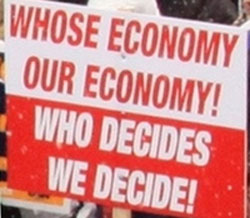 As part of the meeting in Hamilton, Ontario to discuss U.S. Elections, Rolf Gerstenberger, former President of United Steelworkers Local 1005 and President of the Marxist Leninist Party of Canada, which hosted the event, gave an important presentation. Gerstenberger brought to the fore the experience of Hamilton steelworkers fighting to defend their rights, jobs and the steel industry, and how this gives them a perspective on what is going on in the U.S. He gave the example of President-Elect Donald Trump's nominee for Secretary of Commerce, Wilbur Ross. He recalled that as steelworkers fought Stelco's bankruptcy in 2003, they necessarily had to find out what had happened in the U.S. steel industry. They had been told that the U.S. steelworkers had "helped out" their companies and now Hamilton steelworkers should do the same for Stelco. At that time, some 40 U.S. steel companies sought Chapter 11 bankruptcy protection or actually went bankrupt and this was used to shaft 250,000 pensioners who had their benefits cut by 10 to 70 per cent. It was none other than Wilbur Ross who bought up various steel plants and was responsible for some 190,000 of these pensioners being deprived of their pensions and benefits, workers he said were collateral damage.
As part of the meeting in Hamilton, Ontario to discuss U.S. Elections, Rolf Gerstenberger, former President of United Steelworkers Local 1005 and President of the Marxist Leninist Party of Canada, which hosted the event, gave an important presentation. Gerstenberger brought to the fore the experience of Hamilton steelworkers fighting to defend their rights, jobs and the steel industry, and how this gives them a perspective on what is going on in the U.S. He gave the example of President-Elect Donald Trump's nominee for Secretary of Commerce, Wilbur Ross. He recalled that as steelworkers fought Stelco's bankruptcy in 2003, they necessarily had to find out what had happened in the U.S. steel industry. They had been told that the U.S. steelworkers had "helped out" their companies and now Hamilton steelworkers should do the same for Stelco. At that time, some 40 U.S. steel companies sought Chapter 11 bankruptcy protection or actually went bankrupt and this was used to shaft 250,000 pensioners who had their benefits cut by 10 to 70 per cent. It was none other than Wilbur Ross who bought up various steel plants and was responsible for some 190,000 of these pensioners being deprived of their pensions and benefits, workers he said were collateral damage.
Gerstenberger explained that Local 1005 categorically rejected any fraudulent use of bankruptcy proceedings to shaft the workers. The view of some U.S. labor leaders was that, "The house is on fire, you have four kids, but you can't save all of them — which ones do you save?" Hamilton steelworkers rejected this craven position as an unacceptable capitulation to the neo-liberal agenda of the rich. He pointed out that neither parents nor first responders approach emergency situations by making such calculations. For instance, first responders go all to save all the victims of a fire. Only by fighting on a principled basis and putting all the necessary organization in place and devising strategies and tactics to achieve success, can the result be found acceptable, Gerstenberger said. Instead, the sacrifice of pensioners in the U.S. was presented by Wilbur Ross as an economic necessity. Some labor leaders still consider Ross a friend of the workers and they have not raised a peep about his nomination. Gerstenberger pointed out that knowing this about Trump's pick for Secretary of Commerce gives an idea of the agenda of the incoming administration, despite its claims that it will look out for the "little guy" and support the workers.
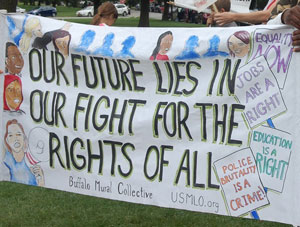 Similarly, Gerstenberger pointed out that Trump's nominee for Labor Secretary is Andrew Puzder, who is a fast food oligarch and CEO of the monopoly that owns the Hardee's and Carl's Jr. restaurant chains. He is known for his anti-worker positions and support for the use of undocumented workers as "cheap labor." Gerstenberger noted that the economy of California and much of the southwest would not be able to function without exploiting these vulnerable workers. Puzder's openly anti-worker stands have given rise to objections on the part of organized labor in the U.S., he added. Puzder opposed the increase to $10.10 an hour minimum wage under Obama and will oppose the workers' current fight to raise this to $15 an hour. Likewise, he will be opposing pensions, saying that no one wants them anymore and they are a drain on society.
Similarly, Gerstenberger pointed out that Trump's nominee for Labor Secretary is Andrew Puzder, who is a fast food oligarch and CEO of the monopoly that owns the Hardee's and Carl's Jr. restaurant chains. He is known for his anti-worker positions and support for the use of undocumented workers as "cheap labor." Gerstenberger noted that the economy of California and much of the southwest would not be able to function without exploiting these vulnerable workers. Puzder's openly anti-worker stands have given rise to objections on the part of organized labor in the U.S., he added. Puzder opposed the increase to $10.10 an hour minimum wage under Obama and will oppose the workers' current fight to raise this to $15 an hour. Likewise, he will be opposing pensions, saying that no one wants them anymore and they are a drain on society.
Regarding Trump's disposition to the workers and his claim that he will "Make America Great Again" by bringing jobs back to the U.S., Gerstenberger referred to Trump's intervention with the Indiana factory — air conditioner manufacturer Carrier — that Trump claimed saved 1,100 jobs from being moved to Mexico. Trump tweeted that this is what he will do for all U.S. workers. The local union leader responsible for those workers pointed out only 800 jobs will stay and that hundreds of others will still be lost to a plant in Mexico. For presenting the real facts, the union leader was then subjected to all manner of personal attacks, first by Trump and then others unleashed by Trump's example.
Trump used Twitter to attack the union president, calling him a "union boss" to imply that he is a parasite and claiming the union is taking excessively high dues, and other anti-union, anti-worker venom. The polity is then set in motion to either support or oppose what the Trump tweets say and this becomes the agenda until the next personal attacks are tweeted against somebody else. People not only in the U.S. but worldwide are supposed to hang on Trump's every tweet and the media speculation about them. Reducing politics to personal attacks and defamation on the part of the rulers is the level to which U.S. governance has degenerated, Gerstenberger pointed out. He emphasized this is how police powers operate when there is no modern political process of any kind, let alone due process of law when it comes to crime and punishment.
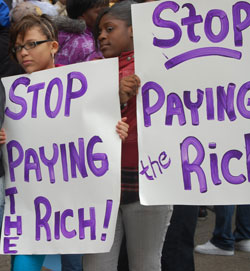 The main issue in this situation, said Gerstenberger, is to take practical measures to change the situation in a way that favors the workers. In Hamilton, the steelworkers face a sales process and a company that is using the Companies' Creditors Arrangement Act (CCAA) to attack the active and retired workers through a court process that is considered perfectly legal. How do the workers fight on this basis? The federal government and MPs say nothing can be done from their point of view because the matter is before the court and the federal government does not have standing there. However, once a deal has been reached, they can give money to the new owner. Once again Wilbur Ross' line that in order to "save the company" some of the pensioners and other benefits have to be sacrificed is shamelessly followed, Gerstenberger said. Steelworkers' own bitter experience shows that making the rich richer has nothing to do with saving companies and anyone who says differently is merely indulging in self-serving argument to get what they want.
The main issue in this situation, said Gerstenberger, is to take practical measures to change the situation in a way that favors the workers. In Hamilton, the steelworkers face a sales process and a company that is using the Companies' Creditors Arrangement Act (CCAA) to attack the active and retired workers through a court process that is considered perfectly legal. How do the workers fight on this basis? The federal government and MPs say nothing can be done from their point of view because the matter is before the court and the federal government does not have standing there. However, once a deal has been reached, they can give money to the new owner. Once again Wilbur Ross' line that in order to "save the company" some of the pensioners and other benefits have to be sacrificed is shamelessly followed, Gerstenberger said. Steelworkers' own bitter experience shows that making the rich richer has nothing to do with saving companies and anyone who says differently is merely indulging in self-serving argument to get what they want.
Gerstenberger then addressed the positions of some of the main unions in the U.S. Some labor leaders say they are in disagreement with Trump's values but are willing to work with him when it comes to jobs. They have written Trump to say that they can find common ground on the economy. How can the issue of values and the economy be separate, Rolf asked, adding that all of this backwardness is being presented to split the working class so that it does not defend its class interests as a united front. This is also why the election results are presented as if the working people of the U.S. do not exist as American workers, but only in terms of race, gender, religion, and so on. The people are presented as divided in every possible way with disparate interests. All of it is to deny that there is one working class with its class interests, that people have rights by virtue of their being human and that on this basis everyone must unite to open society's path to progress.
[TOP]
Positions of Trade Unions on the Elections
One of the biggest problems facing the U.S. working class and people is that the voice of the working class is effectively silenced. Not only are relatively few workers unionized — the rate of unionization has slipped from 20 per cent in 1983 to 11 per cent today — but the union centrals generally toe the line of the old politics of siding with one faction of the U.S. ruling class in its battle for power. This does not contribute to building the unity of the class.
 The position of U.S. unions and the international unions based in the U.S. is to support the crisis-ridden U.S. democracy by saying that Trump's election represents the voice of the people. Certain unions suggest that through the presidential election the people were given a chance to decide the direction of the country. They declare that this is what U.S. democracy is all about, to arrive at a verdict of the people. Within this, most claim that their union membership was divided along a "left-right" ideological divide. They ignore the results which show that a large plurality of workers did not vote for either Clinton or Trump preferring instead not to participate in an election where the two candidates were greatly disliked and generally considered "the two most unwanted."
The position of U.S. unions and the international unions based in the U.S. is to support the crisis-ridden U.S. democracy by saying that Trump's election represents the voice of the people. Certain unions suggest that through the presidential election the people were given a chance to decide the direction of the country. They declare that this is what U.S. democracy is all about, to arrive at a verdict of the people. Within this, most claim that their union membership was divided along a "left-right" ideological divide. They ignore the results which show that a large plurality of workers did not vote for either Clinton or Trump preferring instead not to participate in an election where the two candidates were greatly disliked and generally considered "the two most unwanted."
Some unions have declared that the election results show that the economic and political system is broken, and are an indictment of the same old "politics as usual," yet they continue to yearn for "business as usual." An expression of this sentiment is the statement of the AFL-CIO. Its President Richard Trumka says in a statement:
"Donald Trump has been elected president. America is a democratic nation, and the voters have spoken. The AFL-CIO accepts the outcome of this election and offers our congratulations to President-Elect Trump. More than anything, this election is an indictment of politics as usual."
According to the AFL-CIO, the people have spoken, yet the national vote count shows Clinton ahead by more than 2 million votes. Trump's victory, it says, is largely due to angry workers facing the phenomena of growth without manufacturing, poor job creation, and U.S. jobs leaving the U.S., especially in what it calls the "rustbelt battlegrounds." It asserts the elites turned their backs on the workers, especially with the global trade agreements sending jobs overseas. This tipped the Electoral College vote in favor of Trump with victories in the heavily industrialized states of Pennsylvania, Ohio, Indiana, Wisconsin and even Michigan, all states the Democrats recently have won.
The AFL-CIO does not explain or attempt to analyze how changing one elite oligarch for another elite oligarch could possibly favor the working class. It does not analyze why "angry workers" should vote for a virulently anti-worker oligarch such as Clinton, who is a promoter of sweatshops in Haiti, or Trump who personally has a vicious record of attacking his own hotel and casino workers.
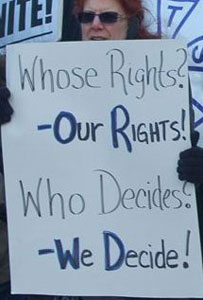 The union central avoids any serious discussion of why working people are not prepared to defend themselves in the face of the imperialist election or how to go forward in a manner that favors the interests of the workers and does not create illusions that Trump will do so. What role have the organized unions played in leaving the working class without an outlook that can provide it with a solid vantage point to engage imperialist democracy, and its electoral system in battle, in good conscience and with actions with analysis?
The union central avoids any serious discussion of why working people are not prepared to defend themselves in the face of the imperialist election or how to go forward in a manner that favors the interests of the workers and does not create illusions that Trump will do so. What role have the organized unions played in leaving the working class without an outlook that can provide it with a solid vantage point to engage imperialist democracy, and its electoral system in battle, in good conscience and with actions with analysis?
Some union leaders look for continuity in their role within civil society even though Trump severely threatens them in practice at his hotels and casinos and in his speeches, which are laced with police state rhetoric.
Most union leaders heavily favored Clinton and widely campaigned amongst their membership to vote for her. The unions recognized the differing views among the workers during the election — but failed to analyze that striving to divide the working class on a sectarian basis based on one or another of the oligarchic parties is precisely a main role of the outmoded institutions, in order to block the people from power. Promoting this sectarian split along party lines open the working class to the vulnerability of siding with this or that so-called right-wing or left-wing faction of the financial oligarchy, instead of uniting to defend its own interests. This siding with the rich can mean participating in a reactionary civil war, which is seriously brewing at this time.
Embroiling the working class in the inter-monopoly and inter-imperialist politics of the oligopolies and financial oligarchy greatly weakens the working class movement as it obscures the underlying division in the U.S. between social classes, especially the class struggle between the working class and those who own and control social wealth and property — the oligarchs and their representatives like Trump and Clinton.
The International Brotherhood of Electrical Workers (IBEW) sees only divisiveness between its leaders and some who followed them in voting for Clinton and other members who voted for Trump.
"This was a long, and at times, divisive, election, but as brothers and sisters in the IBEW, there remains much more that unites us than divides us, and it's more important now than ever that we work together over the coming days, months and years," a statement says.
But how to accomplish such unity and for what aim is not addressed. Left unsaid is the need for independent politics of the working class organized of, for and by the workers themselves with their own worker politicians.
Instead, the IBEW says: "Last Tuesday revealed a deep anxiety among the electorate over a declining middle class, stagnant wages and the sense that our political system is rigged in favor of the top 1 percent."
No Common Ground with Trump
A working class conscious of its independent politics would never leap from the difficulties it faces into the arms of the likes of Trump. Instead of arriving at warranted conclusions of the need to strengthen the organized front of the working class, the IBEW disgraces itself with words of conciliation that claim "common ground" between the workers and Trump.
"To the extent that President-Elect Trump is serious about working toward growing the middle class and providing real opportunities for working Americans, we're willing to work with him. On issues like trade, infrastructure, jobs and outsourcing, there can be common ground between us, and I'm committed to finding it," says IBEW President Lonnie R. Stephenson.
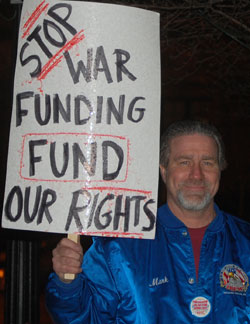 These issues are precisely those where Trump and his new cabinet, such as Wilbur Ross, appointed as Secretary of Commerce, have shown no common ground whatsoever with the working class. Why not conclude the obvious based on the reality that confronts the polity and deliberate on how workers will deal with that?
These issues are precisely those where Trump and his new cabinet, such as Wilbur Ross, appointed as Secretary of Commerce, have shown no common ground whatsoever with the working class. Why not conclude the obvious based on the reality that confronts the polity and deliberate on how workers will deal with that?
The effort of certain union leaders is now to find a niche where they can go back to conducting "business as usual" despite the elections and Trump's cabinet appointments showing that the U.S. election has plunged the U.S.-dominated imperialist system of states and the entire world into a situation where "business as usual" is no more.
The world exists as it presents itself, yet certain union leaders ostensibly representing the interests of the working class appear to be looking for some "common ground" with the Trump regime. They imagine some common ground will emerge from Trump's pledge that he will change the situation facing the angry workers of the heavily industrialized states. The union leaders insist that Trump follow up on his promises and that the unions must show an ability to negotiate with the people with whom they disagree. An example is the statement of the International Association of Machinists and Aerospace Workers (IAMAW). The IAMAW puts on a brave face and says:
"As a labor union, we deal with those whom we disagree with every day at the bargaining table. We try to find common ground. That's exactly what we intend to do in this new reality."
Jobs Are Not Things, They Are Social Relations Amongst People
The common ground is said to be "jobs" and it is claimed that this is Trump's agenda as well. The unions seek common ground with Trump over "things" such as jobs but say they differ over "core values," which they will not compromise. Presumably jobs and core values are unrelated. Totally ignored is the fact that Trump's aim and that of the workers are diametrically opposed to one another. For Trump, jobs are things not workers with rights and class interests in contradiction with those who own and control social property.
Here, many U.S. union leaders say they face a dilemma and must make use of their negotiating ability to find common ground between jobs and their "core values," on which they will never compromise. In this dilemma, "jobs" and their creation are presented as things, not relations people enter into to make a living and from which the oligarchs can seize the added-value workers produce. Because jobs are considered things and not relations amongst people, in particular between employees and employers, the union leaders present these things without concrete core values based on the rights of the working class and its wish for equilibrium in class relations. Jobs are considered "just jobs" without ideology, without politics of any kind, without even class struggle in defense of rights, without the reality that under imperialism, jobs exist within an antagonistic dialectical social relation between the working class and those who own and control social wealth such as Trump and Clinton. Within the difficult social relation, the working class fights for equilibrium that at least recognizes its rights and prepares itself for an opening towards building the new outside the social relation.
The direction Trump — or Clinton for that matter — takes the economy and whom it serves, according to many union leaders, is not germane to the relations between them and the Trump presidency as long as jobs are created, and their "core values" are respected at least generally in words if not in deeds in the hurly burly world of class struggle. The core values remain disconnected from reality and without historical context within the imperialist system of states and certainly not connected with the concrete conditions of working class struggles in defense of their rights and the rights of all.
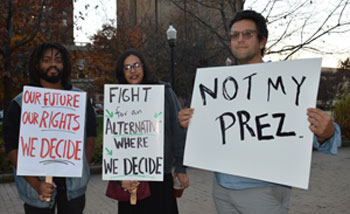 Some union leaders say they recognize the differences between themselves, who campaigned and voted for Clinton along with some members, and other members who voted for Trump. Again, no heed seems to be paid to those who did not vote at all and why people vote the way they do or do not vote. The vote is presented as occurring without historical context and without consideration of the many people who participated in actions with analysis to oppose the imperialist elections and their fraudulent electoral process as best they could and are searching for an alternative.
Some union leaders say they recognize the differences between themselves, who campaigned and voted for Clinton along with some members, and other members who voted for Trump. Again, no heed seems to be paid to those who did not vote at all and why people vote the way they do or do not vote. The vote is presented as occurring without historical context and without consideration of the many people who participated in actions with analysis to oppose the imperialist elections and their fraudulent electoral process as best they could and are searching for an alternative.
The results of the election show that the large majority directly voting against Trump together with those not voting number more than 170 million. What this majority holds in common is that its decision to oppose Trump or oppose the entire imperialist electoral process does not count in the U.S. political system. They are disenfranchised from the result, which is a Trump presidency with all the power that entails. The working people are disempowered locally, regionally and nationally.
The vote does not signal a common ground between the working people and the financial oligarchy. If anything it signals a repudiation of an imperialist electoral process that produced such unwanted pro-war, racist candidates. Why not conclude that and deliberate on how workers are to organize themselves as a powerful front capable of defending their rights with actions with analysis, and which constantly builds workers' consciousness of themselves and their unity in the struggle for a new pro-social direction for the economy and society.
[TOP]
